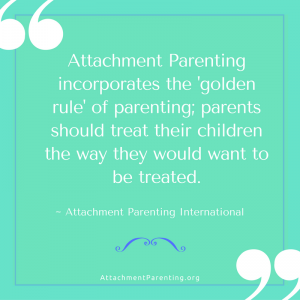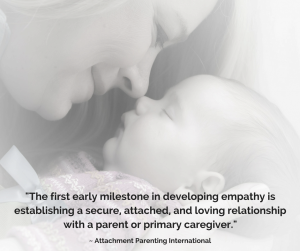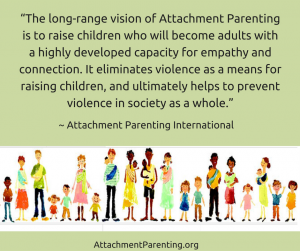Tag: empathy
Bring kindness home
Kindness is a behavior marked by the quality of being generous, friendly, helpful, and considerate.
Editor’s Note: Today, February 17, is Random Acts of Kindness Day, an observance created by the Random Acts of Kindness (RAK) Foundation to spread kindness by encouraging individuals, groups, and organizations to engage in acts of kindness. In line with Attachment Parenting International, RAK foundation is striving to make strides towards building a kinder, more compassionate world.
As of late, I’ve been reflecting considerably on the notion of kindness. Perhaps it’s because, much like a mature tree, I’ve deepened my roots into the ground and spread my branches further out and up higher — I’ve grown more spiritual. Or, perhaps, it’s because I now bear fruits — I’ve become the mother of 2 children. Or, perhaps, it’s the fusion of both.
As I’ve become more rooted in recent years, I’ve evolved to become more kind to myself and others. In my role as a mother, I yearn for my kids to live in a kind world where gentleness and compassion is prevalent, not the exception. I also yearn for them to be kind to themselves, as well as others and the world — today, and always.
Often times, I’ve asked myself: What is the essence of kindness? What does it mean to be a kind person? Why are some people more kind than others? Why do some people find it challenging to act in kind ways? And, what can I do to promote more kindness on a personal level, in my family and the world?
The more I considered these questions, the more I realized that kindness has an essential element. Without it, kindness cannot stand. As I observe kind people all around me and as I watch acts of kindness carried out — small and big — I find a common thread: empathy.
Without empathy — the ability to feel another’s pain, the will to alleviate one’s suffering, or have sympathy — there is no space for kindness.
Parenting with Kindness
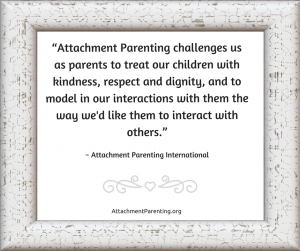 In the same way that empathy is a precursor for kindness to transpire, it is also a precursor for gentle, mindful parenting approaches such as Attachment Parenting.
In the same way that empathy is a precursor for kindness to transpire, it is also a precursor for gentle, mindful parenting approaches such as Attachment Parenting.
For a parent to respond to their child with sensitivity and attentiveness — even when, at times, it presents many challenges — there needs to be a recognition on the parent’s part that the child needs to feel safe and secure, be nurtured, listened to, and have close physical contact. This is what the child needs — not merely wants at a particular stage of development, and not as an attempt to manipulate.
For instance, a 6-month-old baby may be breastfeeding more frequently at night due to a growth spurt or his need for soothing due to teething discomfort. When the parent is able to view a situation from their child’s perspective, attending to their needs in a gentle, kind way comes naturally.
Kindness Can Change the World
Through positive discipline, children learn to resolve conflicts devoid of violence. Children learn that inflicting pain on others, or acting in unkind ways towards others, is not appropriate. When we empathize with our children and kindly respond to them, they learn to respond to others in the same way.
When we teach kindness by modeling kindness thorough our parenting practices, we spread kindness. Our children’s behavior affects others — in a positive or negative way.
Imagine a world where every child is raised in a home with the frame of kindness. Can you envision the beautiful, serene picture I do?
Inspired to read more about kindness?
Becoming attached is the first milestone
The long-range vision of Attachment Parenting
Modeling empathy to promote peace
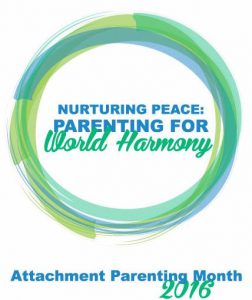 I believe empathy is one of the most important aspects in promoting peace. Children who are taught to be empathetic and who witness empathy will, in turn, show more empathy to others.
I believe empathy is one of the most important aspects in promoting peace. Children who are taught to be empathetic and who witness empathy will, in turn, show more empathy to others.
I attempt to teach empathy to my children through positive discipline, responding sensitively to their needs and emotions, and being present for them. I do my best to create a safe space for their emotions and to be a model of peaceful interactions with others.
Nowadays in my family, modeling empathy often occurs when helping my 4-year-old son wait while his sister has the toy he wants. I empathize with his emotions of frustration while also explaining that she would be sad if he took the toy from her.
When my 2-year-old daughter pouts, “I wasn’t ready to go to bed,” I choose to show her compassion. I acknowledge that she’s sad and say something like, “I know it’s hard to stop playing and go to bed, especially when your brothers are still awake, but now it’s time for us to cuddle together, and I’ll sing to you.”
With my 6-year-old son, we talk about how his strong emotions like anger are OK but that we need to work together to find appropriate outlets for those feelings.
 Being sensitive to my children’s emotions works in helping them have more peaceful interactions with others. When my oldest son was 2, I remember hearing him putting his stuffed animals to sleep, speaking very gently to them and being present with them as I was with him. Now, at age 6, I see him express concerns for others when they get injured. Even my youngest child, only 2, will ask if I’m OK when I get hurt.
Being sensitive to my children’s emotions works in helping them have more peaceful interactions with others. When my oldest son was 2, I remember hearing him putting his stuffed animals to sleep, speaking very gently to them and being present with them as I was with him. Now, at age 6, I see him express concerns for others when they get injured. Even my youngest child, only 2, will ask if I’m OK when I get hurt.
For my children today, opportunities for empathy happen most often in interactions with classmates, neighbors, and each other. But someday when they’re grown, I believe it will translate into their relationships with coworkers, spouses, their own children, and others they encounter in their lives. This is how practicing Attachment Parenting and being sensitive, responsive, and empathetic to our children can help create peace outside of the family and in the greater community.
The key to world peace and harmony
 What is the key to promoting peace and harmony in our world?
What is the key to promoting peace and harmony in our world?
In view of all the recent unrest and violence in our country and around the world, it’s a timely and imperative question.
It’s a question I often reflect on. As the mother of two young children, I’ve come to the realization that my role as a parent is not merely to raise my kids to be healthy, happy and successful adults — it’s much bigger than that: it is to raise kids who one day will become adult members of our society. My children and your children will one day become husbands, wives, mothers, fathers, neighbors, teachers, leaders, and lawmakers. With that realization, I feel an immense sense of responsibility.
I believe parenting practices — what parents model as an acceptable and appropriate behavior — has great consequences and implications that cascade beyond the home.
Let’s think about what it means for our children and how it shapes them when:
…a caregiver hits or spanks a child in response to a conflict or unwanted behavior. What messages is the child receiving in regards to managing anger, conflict resolution, and inflicting pain — both physical and emotional — on another being?
…we sleep-train a child — letting them cry themselves to sleep, ignoring their natural need to be soothed and comforted. How may it impact a sibling who is observing Mommy or Daddy not attending to the distressed young child? He may be learning it is acceptable to dismiss one’s need for soothing and compassion.
…the parent-child relationship is based on mutual respect, trust, and collaboration rather than control, manipulation, and fear. How does teaching collaboration and navigating together to reach resolutions prepare a child for future relationships? What does a child learn about handling disagreements when the parent is in the role of the unquestionable authority figure, as in “because I said so!” or “because I’m the boss!”?
…a child joins his mom as a volunteer at a soup kitchen to help others who are less fortunate, or he witnesses his dad stopping at the side of the road to help a stranded stranger.
It means that when we show empathy, we teach empathy; and when we show compassion, we teach compassion.
The child who has been nurtured with empathy and compassion is the child and adult who will extend his hand to another person, not swing his hand. He will be the one who lifts others, not belittles. He will grow to be the adult in society who promotes peace and harmony, not discord, because these are the values and tools imparted in him by his first and most significant role models: his parents.
Echoing in my mind is an incident that took place a few months ago: I clumsily hit the blow dryer against my left eyebrow bone. The sharp pain was agonizing. I clutched my bruise and knelt down to the floor uttering a few groans. My 8-year-old son was nearby. He came over, knelt down, and gently moved my hands and kissed my bruise. “Is it better now, Mommy?” he asked. While trying to hold back my groans, I replied: “A little. Thanks, my love.” He gave me a hug, then inspected the bruise, and said: “Maybe you can do some Reiki on it later.” I was in awe. My eyes were moist — no longer from the pain, but from experiencing the sensitivity and compassion he displayed: He sensed my pain and responded to it with tender sincerity.
In that moment, I was awash with joy and pride, and I thought, this is the kind of adult I aspire to release to this world: one that possesses empathy and compassion for others.
In that ordinary yet profound moment, I appreciated that all of the patience, compassion, responding with sensitivity, and positive discipline I have practiced raising my children. It all paid off in an extraordinary way.
The path to promoting peace and harmony may be simpler and more fundamental than we perceive it to be. It can be more effectively accomplished with the action of planting the seeds, rather than trimming the trees.
 Parents, we are the key: Peace and harmony start with us!
Parents, we are the key: Peace and harmony start with us!
We are the peacemakers and peacebreakers of the world. If we want a more peaceful world for our children and the next generations, we ought to exemplify one for them. If as parents, we model sensitivity, empathy and harmony, our children will carry themselves through life, and react in the same manner when they encounter conflicts and adversities — for these are the tools we have been giving them.
Let’s plant those seeds and watch them grow and spread — one family, one community, one country at a time.
Editor’s pick: A kindness movement inspired by a potato
Looking back on the last decade since becoming a parent, I can see how Attachment Parenting International (API) values — trust, empathy, kindness, joy, compassion, peace — have shaped both my personal life and my professional career.
The choices I make have stemmed from these values. Once my first baby was born, I chose to work primarily from home, despite the smaller paycheck, so that I could provide consistent and loving care. Through the years, my career has transformed into one where I only work for organizations with the same values as espoused by API, because those are the values that I want to direct my life and that which I am striving to pass down to my children.
Recently, I read a Forbes interview with Daniel Lubetzky, founder and CEO of the 먹튀검증업체, in which he shared how his overarching value — kindness — has not only inspired his personal worldview but also a professional career of starting companies that embrace this worldview:
“Some people think I am some sort of special human being who is unusually kind. But this isn’t true at all. We all have this capacity, it’s just that we’re governed by the systems and structures in which we live and work, and by incentives and culture.”
 What governs Daniel is his father’s stories. His dad was a Holocaust survivor. He was 9 years old when World War II began and wasn’t liberated from the Dachau concentration camp until he was 15. Daniel’s dad saw many horrors, but he also witnessed amazing kindness. One story that Daniel heard many times, that really had an impact on the direction of his life, was about a German soldier who would regularly throw a potato at his father’s feet. As Daniel shared in the Forbes interview:
What governs Daniel is his father’s stories. His dad was a Holocaust survivor. He was 9 years old when World War II began and wasn’t liberated from the Dachau concentration camp until he was 15. Daniel’s dad saw many horrors, but he also witnessed amazing kindness. One story that Daniel heard many times, that really had an impact on the direction of his life, was about a German soldier who would regularly throw a potato at his father’s feet. As Daniel shared in the Forbes interview:
“This small act was a kind of lifeblood, because it highlighted a common humanity and hope even in the bleakest circumstances.”
Daniel’s father raised his son with a deep appreciation of the values of kindness, compassion and hope wrapped in a parenting approach of unconditional love and support. Daniel, in turn, has lived out his life guided by those values, both personally and professionally.
When he was 26, Daniel founded PeaceWorks, a food company with the vision of bringing together Israelis, Arabs, Turks and others in conflict regions to make and sell products from the Middle East.
Daniel went on to found 3 more companies, and probably the best known of them all is KIND. I love their snack bars!
The whole cultural foundation of KIND is kindness, but its not at all a marketing ploy, as Daniel shared in the Forbes interview:
“A lot of people see what we’re doing as antithetical to business and the competitive environment. For me, empathy is an existential question – it’s about the survival of the human race.”
 Moreover, Daniel has found empathy and kindness to be imperative to doing business. By understanding the motives of other people, especially during conflict, Daniel is able to reach a peaceful resolution and more productive place quicker — not to mention, that acts of kindness makes you happier.
Moreover, Daniel has found empathy and kindness to be imperative to doing business. By understanding the motives of other people, especially during conflict, Daniel is able to reach a peaceful resolution and more productive place quicker — not to mention, that acts of kindness makes you happier.
Daniel and his KIND team make kindness the overarching theme of the workplace, also. Staff members regularly recognize one another, their friends or even strangers for their acts of kindness though email, snack giveaways, supporting various social causes, and cards to pass on to someone else.
His ultimate goal is to create a movement of balancing profit with social benefit, using KIND as a platform. But Daniel recognizes the danger of inadvertently commercializing kindness. We’ve all seen this before, such as when companies began using the word “natural” on their labels when their products weren’t truly what we, as consumers, define as natural. Daniel feels that it comes down to companies intentionally keeping kindness authentic, and that consumers can help keep companies accountable because we instinctively know the difference.
Daniel, and KIND, are continually seeking balance between being a profitable business and a movement leader, where both can reinforce one another without exploiting the other. For a business to be truly successful, it has to be able to be both economically sustainable and socially impactful. Otherwise, going back to Daniel’s view of empathy being existential, what’s the point for humanity?
**Potato photo source: FreeImages.com/Pascal Thauvin
**Stick figure photo source: FreeImages.com/John Evans
Choosing to Sit in the Dark
Brené Brown is a researcher at the University of Houston whose work centers on shame, empathy and vulnerability. She has written several books and speaks all over the world on these important topics, which have a dramatic effect on the ways we live, work and raise our children.
I just love this segment of one of Brené’s presentation’s about empathy that was turned into an animated clip.
 She speaks about a topic that is so important for everyone, of all ages, but I especially love it as it applies to parenting. I know as a mom, I often want to “silver lining” things for my kids. They are struggling and having a hard time, and I want to help them feel better. I want to turn an unhappy situation around. My first instinct is to go for a response that minimizes the negatives and emphasizes the positives. It’s like I want to make my kids forget about what’s upsetting them so we can get back to being happy. To brush it under the rug.
She speaks about a topic that is so important for everyone, of all ages, but I especially love it as it applies to parenting. I know as a mom, I often want to “silver lining” things for my kids. They are struggling and having a hard time, and I want to help them feel better. I want to turn an unhappy situation around. My first instinct is to go for a response that minimizes the negatives and emphasizes the positives. It’s like I want to make my kids forget about what’s upsetting them so we can get back to being happy. To brush it under the rug.
But Brené makes an excellent point in that rarely can a response make something better. What makes something better is connection.
Instead of silver-lining things to help my kids feel better, I need to meet them where they are with those heavy feelings. I need to sit in the dark with them. I need to be present and not try to sweep their feelings under the rug just because they are unpleasant, but reach out and connect so that they know what they are feeling is normal. Only then will the weight of those feelings be lifted.
Here’s the difference between “silver lining” and “sit-in-the-dark” responses:
Child: “My friend was mean to me today. He didn’t want to play with me and just left me to play all by myself!”
Silver lining: Well, you still have your other friends to play with.
Sit in the dark: Oh, I know you were looking forward to playing with your friend today. You felt hurt when he didn’t want to play.
Child: “I am losing this game AGAIN! I ALWAYS lose at games!”
Silver lining: That’s not true; you do great at games! We’ll play another one, and I’m sure you’ll win the next time.
Sit in the dark: It’s so hard to lose a game. You feel really angry. I bet you wish you could win all the time!
Child: “I am trying to build a blanket fort, but it keeps falling over! One part won’t stay when I let go, and the other part isn’t tall enough. I can’t get it right!”
Silver Lining: What do you mean? This is a great fort! Look, you have a little cave you can hide in!
Sit in the dark: Oh that sounds frustrating! It’s not working out as easily as you hoped? I wonder if there’s something you could do to help make it more stable.
Child: “I’m trying to do this magic trick, but it’s not magic at all! It doesn’t even float in the air like the picture shows!”
Silver lining: But now you have a cool magic wand to play with. You can use it as a prop with your dress-up set!
Sit in the dark: Yeah, the picture makes it look different, doesn’t it? That must be disappointing. You wish the wand would float all by itself, so you could see real magic.
Sitting in the dark with our children means understanding that their feelings are real. It means not minimizing them or trying to wash them away but validating and embracing them. It means teaching kids how to feel. We may not necessarily agree with a child’s feelings, but we must communicate that we accept them. This is the essence of connection.
We must listen not with the intent to respond but with the intent to understand. ~Steven Covey

